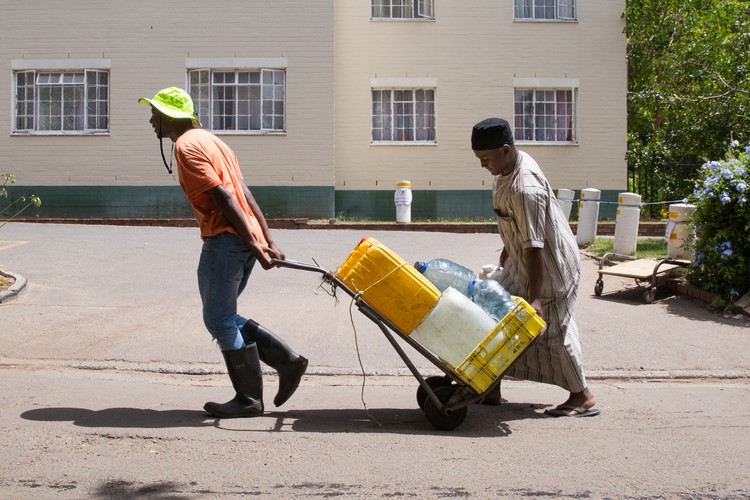Here is the status of Cape Town’s water supply projects
City promises to engage with UCT scientists over concerns about drilling into the Table Mountain Group aquifer

Although seven of the City of Cape Town’s eight alternative water source projects are running behind schedule, six of them will be feeding water into the system well ahead of the current Day Zero projection of 9 July.
One of the projects – a major desalination plant (to provide 100 to 150 million litres a day / MLD), which will be built on a yet to be finalised site in the Cape Town harbour, is still in the planning stages and is unlikely to be fully operational for at least the next 18 months to two years.
The City says it is aware of serious concerns raised by University of Cape Town scientists last week about the environmental impact of drilling operations for certain groundwater abstraction projects. The City said it will engage them to discuss their concerns. (See Rush to drill for water threatens our water supply.)
During a media briefing on Thursday, Deputy Mayor Ian Nielson gave a status update on the alternative water source projects that are planned to augment the City’s water supply with around 180 MLD.
Some 150 MLD will come from groundwater; 16 MLD from temporary desalination; 10 MLD from water re-use; and 4 to 5 MLD from the City’s Albion Spring in Newlands and the New Main Spring at Oranjezicht.
Three of the projects are small-scale emergency desalination plants that will collectively add a projected 16 MLD into the system by May 2018.
They are:
-
The Strandfontein plant: 73% complete at the start of this week and behind schedule according to the City’s Water Dashboard. It is on track to supply 2 MLD into the system when phase one is completed in the second half of March, and a total of 7 MLD when phase two is completed in the first half of May.
-
The Monwabisi plant: 71% complete and also behind schedule, due to add 2 MLD at the end of phase one during the first half of April and 7 MLD when reaching full production in the second half of May.
-
The V&A Waterfront plant, the only one of the eight projects on schedule and 77% complete this week, will add 2 MLD when it comes on-line during the second half of this month. All seven containers have been delivered to the site and construction on the water tanks has started.
There are three groundwater abstraction projects that, collectively at their peak, should supply almost 150 MLD to the City. They are:
-
The Cape Flats aquifer: behind schedule and 59% complete this week according to the Water Dashboard. But Neilson said drilling was “progressing well in all areas”. Additional exploration boreholes had been identified next to Cape Town International Airport and the City was negotiating access to the area. A yield of up to 83 MLD is expected from June.
-
The Atlantis aquifer is already producing 12 MLD but is just 64% complete and behind schedule according to the Water Dashboard. An additional yield of 20 MLD was expected between May and October 2018.
-
The Table Mountain Group aquifers, where exploration drilling began in November last year, were expected to add some 50 MLD. The June target date may not be met because of environmental concerns.
An eighth alternative water source – the temporary Zandvliet water recycling project that is expected to produce 10 MLD when reaching full production by June – is 55% complete and behind schedule, according to the Water Dashboard. Neilson said the City was currently reassessing the water re-use augmentation programme to align it with the licensing conditions of the aquifer water use licences issued by the national Department of Water and Sanitation.
Last week, five prominent UCT academics – Jasper Slingsby, William Bond, Nicky Allsopp, Ed February, Adam West – issued an open Letter of Concern to the City about groundwater abstraction.
“The water supply for the City of Cape Town and surrounding municipalities is in a dire state and there is desperate need to reduce water use and augment supply,” they wrote.
‘While we commend all efforts in this regard, at least one of the augmentation schemes, namely water abstraction from the Table Mountain Group Aquifer, is surrounded by a high degree of uncertainty and we are concerned as to the potential impacts on the environment.
“The current manner in which the project is being implemented poses a major threat to the integrity of our catchments and the quantity and quality of water they provide in the short- and long-term.”
Responding to a question at the media conference, Neilson said he was not personally aware of the letter. However, the City’s environmental compliance manager Keith Wiseman confirmed that the letter had been received. They were “very aware” of the concerns raised but had not yet had time to respond formally.
The Table Mountain Group Aquifer project was still in the planning phase and screening was being done to see whether boreholes planned in environmentally sensitive areas could be moved. The City would work “very closely” with both CapeNature and the UCT scientists going forward, Wiseman said.
Support independent journalism
Donate using Payfast

Don't miss out on the latest news
We respect your privacy, and promise we won't spam you.
© 2018 GroundUp. 
This article is licensed under a Creative Commons Attribution-NoDerivatives 4.0 International License.
You may republish this article, so long as you credit the authors and GroundUp, and do not change the text. Please include a link back to the original article.
